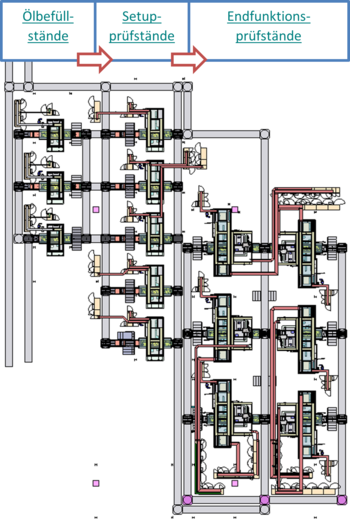Our innovation project with strong partners
JW Froehlich and the Center for Solar Energy and Hydrogen Research Baden-Württemberg (ZSW) have been working together since 2018. The ZSW in Ulm is a leading expert in Europe for the production and quality assurance of fuel cells and our competence partner. Together, we have understood that with the spread of fuel cell technology in heavy-duty transport as well as in buses and trains, stack testing is facing completely new challenges. Power ratings of up to 150 kW and exponentially growing volumes require new ideas and feasible concepts.
That is why we have launched a joint development project. The aim is to design and develop a modular and scalable testing system for PEM fuel cell stacks. To validate the system, a pilot plant will be built and put into operation at ZSW. The state of Baden-Württemberg evaluates the innovative strength of the idea and the partners so positively that the project has been included in the funding program "Zukunftsprogramm Wasserstoff BW".
In this project, JW Froehlich combines its expertise in the automation of quality assurance in series production with ZSW's know-how in production and fuel cell technology . The result is a new level of productivity and quality for the production of fuel cell stacks - applicable for small series as well as for visionary gigafactories of the future.
But which testing system can guarantee the quantity and quality of fuel cell stacks for the future? This question is the focus of the development project. Therefore, we not only want to build a pilot plant, but also develop a comprehensive, market-ready concept for a growing, flexible and learning test system.
You can witness this project live. We look forward to your participation, your feedback on our ideas, your requirements and your inquiries. Let us shape the future of fuel cell production together.
Goals
Modules for all important steps for the evaluation and quality assurance of PEMFC stacks
Modules for the test piece change
(e.g. manual loading, trolley loading, robot loading, belt loading from the front or in throughput)Modules for test specimen adaptation
(e.g. manual adaptation, adaptation via setup adapter and multi-coupling plate, fully automatic adaptation)Modules for productivity increase
(e.g. a pre-station for leak testing or cooling water pre-filling for cycle time reduction or cost reduction)Modules for scaling the power rating of the PEM fuel cell stacks
Modules for scaling the output
Minimization of dead volumes for optimal dynamic characteristics
Reduction of latency in the gas system during load changes
Integration of system-related features such as anode recirculation and purging strategies
Connection to data management systems for series testing
Development of a data management workflow using online analysis software at a remote workstation
AI-based in-test diagnostics and assessment of measurement data history during data recording
AI-based event and alarm detection
AI-based evaluation of test results in single test and serial testing
As well as further requirements resulting from requirement interviews with market experts.
The following figure shows an example of a test system for a dual-clutch transmission with outsourced function or test sections. This must be transferred to the fuel cell stack.

- Application of the above concept for fully automated testing of short stacks (10 kW) with manual loading and unloading in a small series
- Implementation of AI functions for test bench monitoring and evaluation of test results
- Design, construction and commissioning of the test system at ZSW in Ulm, Germany
- Extensive testing and validation of the test system

